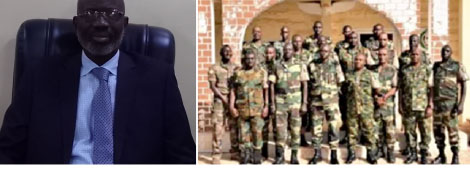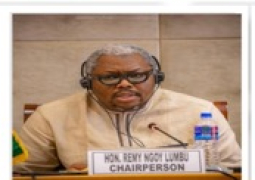
“It should be noted that all peacekeeping missions have timelines and ECOMIG is no exception to this reality, hence the Gambia government is working progressively for the eventual withdrawal of ECOMIG through training and capacity building of The Gambia security institutions,” he said.
Mr Jeng, who was speaking recently at the Sir Dawda International Conference Centre during a press conference, added: “The government is committed to carrying out a comprehensive security sector reform in the shortest possible time with the support of its development partners.”
The presser was meant to sensitise the public on the ongoing Security Sector Reform (SSR) in the country, provide updates on what has been achieved, and highlight the current challenges and their remedies.
This, he went on, is hoped to widen the understanding of the population who are critical stakeholders of the SSR process. It is also aimed to ensure that citizens and residents of the country have the right and accurate information regarding the SSR process.
“Furthermore, the government is committed to ensuring that the security institutions are right sized to make them fit for purpose. Its attainment will invariably translate to a professional, flexible, and national safety and security workforce with the requisite skills and experience, capable of delivering effective and sustainable internal security services, as well as address the global safety and security challenges of the country,” he posited.
“The exercise requires a careful assessment and approach and demands significant funding in line with international best practice. As much as the SSR acknowledges this requirement, there are fundamental processes to be followed such as availing severance packages both monetary and training to security personnel who opted to live on their own accord, as well as those to be retrenched based on necessity.
“It is worthy to state that despite the perceived slow pace from many quarters, the SSR is on course and the government is determined to carry the process to a logical end and well-defined security architecture for the country.”
The Gambia government, Mr Jeng said, remains committed to implementing the key findings and recommendations of the SSR Assessment Report (2017), with a view to reforming the security sector to ensure it is democratically accountable, effective and efficient.
Further highlighting SSR’s achievements, the National Security Adviser said the security services are now reoriented and accountable in safeguarding and upholding the rights of the citizens through oversight mechanisms.
He added that the minister of Interior and Defence and other security service heads are now held to account, providing briefings and answering to the National Assembly oversight committees on defence and security.
The National Intelligence Agency, he went on, has been rebranded as the State Intelligence Service (SIS) since the last six years. The agency, he said, is no longer engaged in arbitrary arrest, detention, torture and other forms of right abuses as evident in the previous administration. The service is now focused on its core mandate of intelligence collection, analysis and dissemination to advise policymakers and other consumers.
The GPF, he added, now hardly detain suspects beyond the mandatory 72 hours as required by law and embrace the concept of community policing approach as accountable and respect human rights and rule of law.
Jeng said GAF has also now focused on its core mandate of safeguarding the territorial integrity of the country, as well as engaging in civil-military relationship to foster better understanding with citizens of the country.
Evidently, he remarked, the security institutions have moved away from being regime-centred institutions to now focusing on their core national security mandates, which has rekindled public trust and confidence in them and the government.





